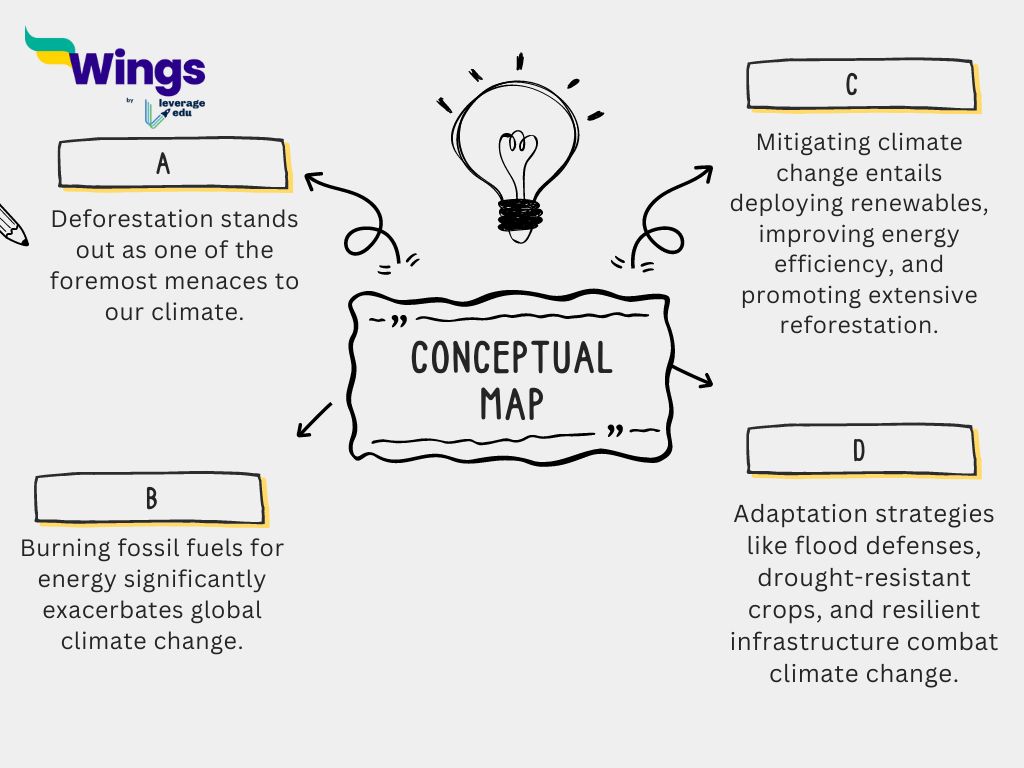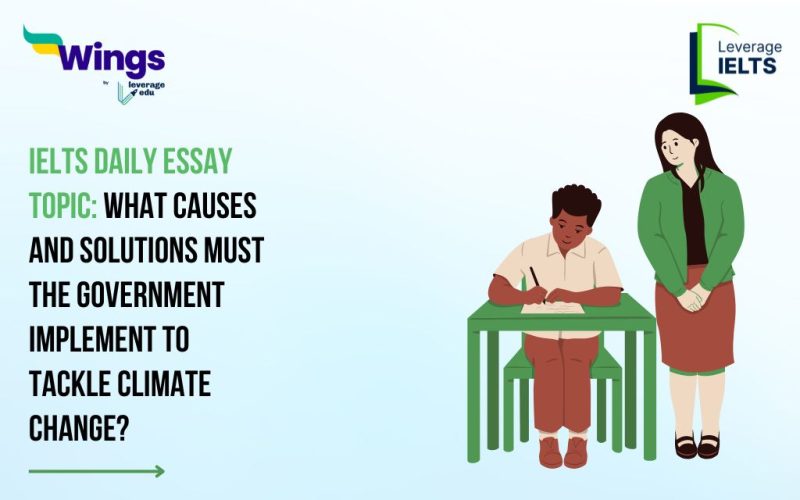Brainstorming Ideas
Refer to the following brainstorming ideas to get a solid understanding of the given answer.
- Among the biggest threats to our climate is deforestation.
- Apart from that, the burning of fossil fuels like coal, oil, and gas for electricity, heat, and transportation contributes largely to the overall climate change across the globe.
- Effective mitigation strategies for climate change include harnessing renewable energy resources, boosting energy efficiency, and large-scale reforestation efforts.
- Adaptation strategies, including building flood defences, developing drought-tolerant crops, and designing buildings capable of tolerating extreme weather conditions, can help tackle climate change.

Q. What causes and solutions must the government implement to tackle climate change?
Ans. Climate change is a pressing issue that poses significant threats to our planet. It is primarily caused by human activities, which include the burning of fossil fuels and deforestation, leading to an increase in greenhouse gases in the atmosphere.
The burning of fossil fuels like coal, oil and gas for electricity, heat and transportation is the biggest contributor to greenhouse gas emissions. For instance, the industrial sector, which includes manufacturing, construction and mining accounts for 22% of global emissions. Deforestation, on the other hand, contributes to climate change as trees absorb Carbon dioxide and reduce its presence in the atmosphere. When forests are cut down, not only does the carbon dioxide absorption cease, but also the carbon stored in the trees is released into the atmosphere.
To tackle climate change, governments must implement two approaches: mitigation and adaptation. Mitigation strategies include transitioning into renewable energy resources, improving energy efficiency and promoting reforestation. For example, the government of Denmark has committed itself to becoming a 100% renewable energy country. Adaptation strategies involve making adjustments to reduce risks caused by climate change. This includes building flood defences, developing drought-tolerant crops, and designing buildings capable of withstanding extreme weather conditions. For instance, the Netherlands, a country significantly below sea level, has developed an extensive system of pumps to prevent seawater from flooding its land.
To conclude, while dealing with climate change is a daunting challenge, it is not insurmountable. With the right policies and actions, governments can play a pivotal role in mitigating its effects and safeguarding the planet for future generations.
Analysis
Paraphrased Statement: Climate change is a pressing issue that poses significant threats to our planet.
Thesis Statement: It is primarily caused by human activities, which include the burning of fossil fuels and deforestation, leading to an increase in greenhouse gases in the atmosphere.
Body Paragraph 1-Topic Sentences: The burning of fossil fuels like coal, oil and gas for electricity, heat and transportation is the biggest contributor to greenhouse gas emissions.
Body Paragraph 1- Supporting Reasons and Explanations: For instance, the industrial sector, which includes manufacturing, construction and mining accounts for 22% of global emissions. Deforestation, on the other hand, contributes to climate change as trees absorb Carbon dioxide and reduce its presence in the atmosphere. When forests are cut down, not only does the carbon dioxide absorption cease, but also the carbon stored in the trees is released into the atmosphere.
Body Paragraph 2- Topic sentence: To tackle climate change, governments must implement two approaches: mitigation and adaptation. Mitigation strategies include transitioning into renewable energy resources, improving energy efficiency and promoting reforestation.
Body paragraph 2- Supporting Reasons and Explanations: For example, the government of Denmark has committed itself to becoming a 100% renewable energy country. Adaptation strategies involve making adjustments to reduce risks caused by climate change. This includes building flood defences, developing drought-tolerant crops, and designing buildings capable of withstanding extreme weather conditions. For instance, the Netherlands, a country significantly below sea level, has developed an extensive system of pumps to prevent seawater from flooding its land.
Conclusion: To conclude, while dealing with climate change is a daunting challenge, it is not insurmountable. With the right policies and actions, governments can play a pivotal role in mitigating its effects and safeguarding the planet for future generations.
Vocabulary in Use
| Word | Meanings |
| Pressing Issue | An urgent matter that requires immediate attention. |
| Poses | The act of adopting a certain posture or attitude, often to make an impression. |
| Significant Threats | Risks that are substantial and can notably influence a situation. |
| Accounts For | Explain the reason for something or constitute the total of something. |
| Cease | To bring something to an end or stop it. |
| Tackle Down | Although not a common phrase, “tackle” usually refers to addressing a problem or challenge. |
| Transitioning | The act of changing from one state or condition to another. |
| Withstand | To resist or oppose something effectively. |
| Daunting | Something that seems intimidating |
| Insurmountable | A challenge or obstacle that is too great to overcome. |
| Mitigating | The process of reducing the severity, harm, or damage of a situation. |
| Safeguarding | The act of protecting something from harm or damage. |
Linkers and Connectors Used:
Following are the linkers and connectors used:
- For instance
- On the other hand
- In order to
- For example
- To conclude
- While
Are you preparing for IELTS? Check out this video to improve your writing skills for the IELTS exam given below👇.
| Related Blogs | ||
| IELTS Eligibility: IELTS Exam Age Limit & Qualification | IELTS Exam Dates, Registration, Result, Preparation | IELTS Sample Tests: PDF (Download), Exam Pattern |
| IELTS Marking Scheme | IELTS Scoring System & Grading | IELTS Test Centres in India | IELTS Syllabus & Section-Wise Exam Pattern |
Download the Leverage IELTS App today.


Need help preparing for IELTS? Check out the best IELTS preparation courses in the market offered in a live training environment by trusted educators. If you want to help studying abroad, call 1800572130.


 One app for all your study abroad needs
One app for all your study abroad needs












 60,000+ students trusted us with their dreams. Take the first step today!
60,000+ students trusted us with their dreams. Take the first step today!